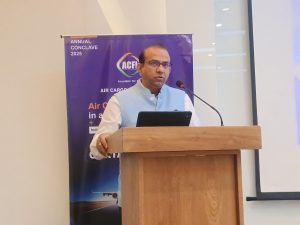Arun Chandra, Vice President – Aviation Business, BIAL said, “We see PMGS as a key enabler in our mission to position BLR Airport as a premier cargo and logistics hub for South India and a vital node in the national supply chain. Through Gati Shakti’s framework, we have seen enhanced alignment between air, road, and rail connectivity—facilitating more efficient cargo movement and reducing transit bottlenecks. The initiatives like ULIP have played a pivotal role in enabling real-time data exchange and streamlined inter-agency coordination, improving turnaround times, especially for high-value and perishable goods. At BLR Airport, we have aligned our infrastructure development with the objectives of PM Gati Shakti, exemplified by India’s largest Domestic Cargo Terminal and the upcoming Logistics Park. These investments are designed to create a seamless, tech-enabled ecosystem that supports efficient end-to-end cargo solutions. The initiative aligns with our digital-first approach, driving automation and enhancing operational transparency. This transformation is essential to meet the demands of a growing trade economy, offering cutting-edge solutions like ACS, and ensuring service excellence across all cargo operations.”
Read More »Delhivery expands Chandigarh Gateway Hub, increases 30% capacity
Delhivery announced the expansion of its Chandigarh Gateway Hub. The facility, spread across 2.35 lakh sq ft will accelerate the region’s economic growth. With the new infrastructure, Delhivery will offer 30% more storage capacity to meet the requirements of the region’s needs and incorporates automation to handle shipment volumes with efficiency. It will also empower thousands of businesses in the region, enabling them with access to nationwide markets through improved inventory storage and order fulfillment capabilities “Chandigarh and its surrounding region remain a core market for us. This expansion directly addresses the needs of local businesses, enabling them to deliver products faster to customers nationwide. Beyond facilitating commerce, the expansion will drive growth in supporting sectors like packaging, transportation, and local last-mile logistics, creating jobs within the community. As we approach the festive season, this facility will elevate customer experience by enabling fast and precise services,” said Dingtang Tikhak, Senior Vice President, Regional Hub Operations, Delhivery. This includes a Hub Conveyor Solution with a 4,000 throughput per hour capacity that helps sort both incoming and outgoing shipments. The hub also includes a Cross Belt Sorter (CBS) with a 12,000 throughput per hour capacity for rapid and precise shipment processing. Together, these technologies reduce turnaround time and increase the overall efficiency of the supply chain and can be valuable during peak demand periods like the upcoming festive season.
Read More »Delhivery boost on-demand intracity logistics with new app
Delhivery launched on-demand intracity shipping on the Delhivery Direct app in Delhi-NCR and Bengaluru after a successful pilot launch in Ahmedabad. The service offers pickups within 15 minutes of booking for local deliveries using two-wheelers for parcels as well as three and four-wheeler vehicles for larger consignments. “We are now fully live with Delhivery Direct across NCR and Bengaluru – two of the largest markets for on-demand intracity service in India and will rapidly expand to key metros,” said Sahil Barua, MD & CEO, Delhivery. “This launch provides millions of consumers and SMEs across the country with a logistics solution that simply works: fast, affordable, and reliable and completes the spectrum of offerings to our customers who can now use us for intracity needs as well.” Delhivery Direct not only simplifies shipping for users, but also significantly benefits riders and drivers by providing consistent earning opportunities and flexible working hours through Delhivery’s extensive network. The Delhivery Direct App is available on Google Play and Apple App stores where customers can download and book their intracity orders on-demand. It also allows you to ship intercity shipments across small and large parcel types to anywhere across the 18,800+ pincodes in India that Delhivery serves from your doorstep.
Read More »‘Process simplification must to improve logistics efficiency & growth’
“India has tremendous growth potential. India’s ranking in LPI has considerably improved and with ease of doing business, LPI ranking needs to improve more,” said Sanjeev Edward, President ACFI and CEO – Cargo and Logistics, GMR Group, while addressing the media at ACFI curtain raiser event, ahead of its upcoming annual Conclave on 11 July in New Delhi. He added, “Process simplification is must to achieve operational efficiency. At ACFI, we are focusing on process simplification and paperless transactions. With the ‘Go Green’ initiative, we have added ESG to it. We are also focusing on promoting domestic as well as international cargo movement and making air cargo the preferred choice of transport. We will focus on domestic cargo also this year. We will also focus on women diversity and inclusion, Special Economic Zones, cargo hubs, multimodal connectivity, capacity building etc.”
Read More »‘Air freight rates from India to Europe & Asia will hike by 10 to 20%
Gautham Raju, Senior Manager – Global Air Freight and Head of Air Freight at WIZ said, “Due to the war between Iran and Israel, several countries in the general region, including Jordan, Iraq, Lebanon and Israel, have temporarily closed their airspaces. If the war prolongs further, we could definitely expect an increase in oil and gas prices, which could also indirectly impact the rise of Jet fuel prices, which could directly result in an increase in freight charges. We foresee that air freight rates from India to Europe and Western Asia are going to be increased between 10 to 20 % due to potential re-routes that are longer than normal, which require excess fuel carriage and lesser payloads for cargo. The ongoing war is significantly impacting perishable and low-value cargo.”
Read More »Softlink signs MoU to train workforce in customs & logistics
Softlink Global has signed MoU with Mumbai Rozgaar to create skilled workforce in freight forwarding, customs brokerage and allied logistics services. The alliance joins Softlink’s three-decade domain expertise with Mumbai Rozgaar’s recruitment reach to supply job-ready professionals for operations desks across India, the Middle East and Africa. Logistics is one of the country’s largest employment engines, yet thousands of frontline seats remain vacant while millions of semi-skilled workers struggle for formal jobs. The new partnership turns that mismatch into opportunity through: Certified, 3-month internships on live logistics systems Role-based training tracks – Documentation Executive, Operations Coordinator, Warehouse Assistant and more Guaranteed interviews and placement support across Softlink’s 800+ client locations A target to place 2,000 candidates within 18 months “We see freight forwarders losing business because desks are empty,” said Amit Maheshwari, CEO, Softlink Global. “By matching unemployed youth with industry-validated training and real jobs, we’re investing in both social mobility and sector efficiency,” he added. The initiative will operate under Softlink Academy, the company’s skilling arm, extending its reach into vocational colleges, community centres and state employment exchanges. Cohorts begin in August 2025; participating employers can book slots immediately.
Read More »‘Similar tensions previously drove 10%to 15% airfreight costs’
C K Govil, President, ACAAI said, “Since Iranian, Iraqi and Israeli airspaces are shut, Indian airlines are diverting flights through Central Asia, Saudi Arabia, Egypt, Turkey, or via Hindu Kush routes. This rerouting adds hours to flight times, increases fuel usage and forces extra technical stops, pushing costs up. While exact rates aren’t yet public, similar tensions previously drove a 10–15 % air‑freight cost increase. Indian cargo trade is impacted, across both air and sea lanes, due to longer routes, rising fuel/insurance costs and logistical shifts. Expect exporters to feel margin pressure unless the situation stabilises soon.”
Read More »‘No considerable hike in airfreight by carriers‘
Sunil Kohli, Managing Director, Rahat Cargo said, “The present air space closure situation has significantly impacted several international air routes that usually traverse Iranian skies, particularly those operating between India and Europe & North America resulting in a surge in cancellation and rescheduling of flights originating from India. However, consequently no noticeable increase in the airfreight by the carriers have been observed yet the uncertainties regarding the flights have been looming large among the stakeholders. Further, an un-decided schedule coupled with extended hours of flying thus causing considerable delays in arriving the destinations have left the shippers of perishable & pharma products in quandary apprehending spoilage of their products due to impending delays. The frequent cancellation, rescheduling added with payload constraints of its flights destined abroad from all Indian stations by the dominant carrier Air India has resulted in considerable quantum of exports.”
Read More »‘Industry must monitor ongoing situation to see the impact of extended conflict’
Jalpa H Vithalani, Director, Global Aviation Services said, “Currently, there seems to be no adverse effect on the air cargo industry. There hasn’t been any increase on the fuel surcharges nor the air cargo tariffs. There have been a few regional sectors that have had closures due to security/safety measures but the volumes haven’t been affected to a large extent. The air space closure has resulted in some air routes altered but this too hasn’t impacted the trade in a way to be worried about. But if the conflict extends, the sea routes could be affected such as Strait of Hormuz which could have a cascading higher demand for air cargo. The air cargo fraternity needs to monitor the events in the coming weeks to assess the impact of an extended conflict.”
Read More »‘Conflict may lead to reduced predictability, fragmented cargo flow & elevated costs’
Balagopal Balachandran, National Head, Air Freight, FEI Cargo said, “Just as global trade was stabilising with shipping returning to the Red Sea, the Iran-Israel conflict has reignited fears of oil price surges and trade disruptions. For India , which imports over 80% of its crude oil poses significant macroeconomic risks. The Iran-Israel conflict has directly translated into elevated costs, reduced predictability, and a fragmented cargo flow for Indian EXIM stakeholders. While freight forwarders and carriers have responded by introducing dynamic routing and premium service tiers, the longer-term solution lies in diplomatic stability and regional cooperation. For now, Indian exporters and importers must navigate this volatile environment through agile planning, contractual flexibility, and close alignment with airline and GSA partners. While demand remains relatively stable due to backlogged shipments and seasonal peak movements, available capacity has been moderate. Globally several freighter operators are now reallocating space on a yield basis, leading to priority being given to high-margin cargo. This has resulted in a skewed cargo mix and longer waiting times for general and low-yield freight.”
Read More » Cargo Breaking News
Cargo Breaking News








